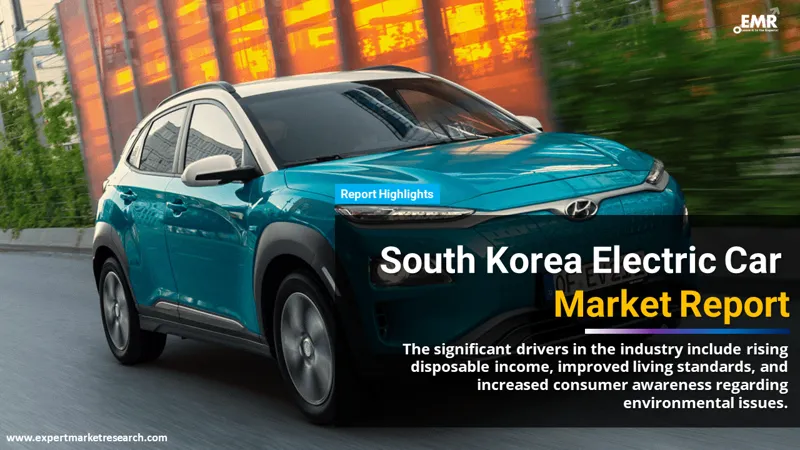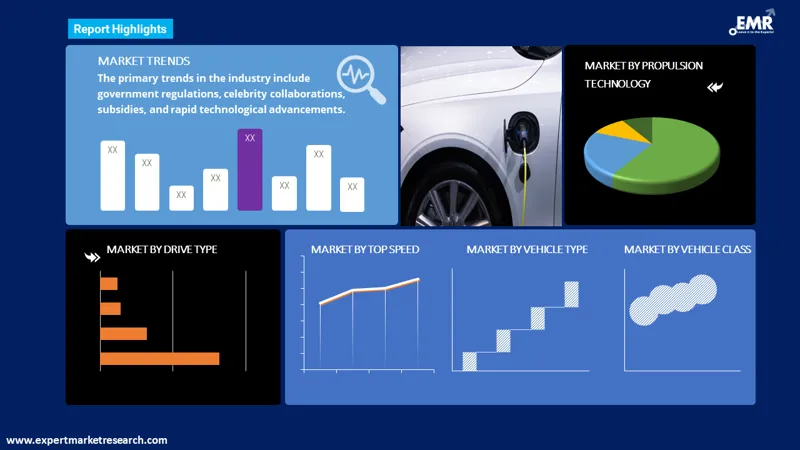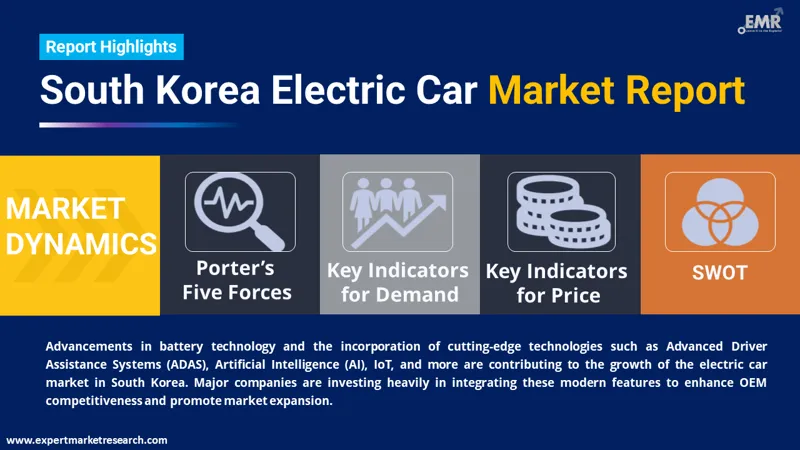
Consumer Insights
Uncover trends and behaviors shaping consumer choices today
Procurement Insights
Optimize your sourcing strategy with key market data
Industry Stats
Stay ahead with the latest trends and market analysis.
The South Korea electric car market is expected to grow at a CAGR of about 33.80% in the forecast period of 2026-2035. The Government’s support to popularise electric vehicles and celebrity collaborations with automobile brands are anticipated to drive the market for electric cars during the forecast period.
Base Year
Historical Period
Forecast Period
Compound Annual Growth Rate
33.8%
2026-2035
*this image is indicative*
An electric vehicle is referred to as an EV. EV cars run entirely or mostly on electricity. While some electric vehicles (EVs) use lithium-ion batteries, lead-acid or nickel-metal hydride batteries are now considered the industry standard because of their improved energy retention and better durability.

Read more about this report - REQUEST FREE SAMPLE COPY IN PDF
South Korea electric car market expansion can be attributed to the government support, expanding charging infrastructure, and increasing consumer awareness. By 2030, the government aims to have over 8 million electric cars on South Korean roads. To support this, the government is providing subsidies for EV purchases, investing in charging infrastructure, and commercialising autonomous EVs till 2030. Celebrity collaborations with automakers are also anticipated to boost consumer interest.
Surge in EV sales, growth of electric vehicle charging stations, and technological advancements are boosting the South Korea electric car market development
The use of electric vehicles, specifically electric cars is anticipated to expand throughout the forecast period because of factors such as increasing purchasing power, rising cost of fuel, steady depletion of fossil fuels, and government campaigns to raise public awareness about sustainable electric vehicles in the country.
The country has made significant initiatives to install a substantial number of charging points across cities like Seoul. The Seoul Metropolitan Government aims to install 10,000 public charging stations by 2025, making it easier for drivers to charge their vehicles on the go.
Market players are heavily investing in research and development to advance EV technology, enhance production facilities, and expand EV charging infrastructure, which is shaping the South Korea electric car market outlook. Hyundai and Kia are investing in autonomous driving technologies, with plans to commercialise Level 3 autonomous vehicles by 2025.
Government initiatives such as tax breaks, financial aid, and investments in research and development are encouraging consumers to switch to electric vehicles. The government offers a subsidy of up to 14 million won for purchasing an electric vehicle, making EVs more affordable and attractive to consumers.
South Korea is expanding its electric car charging infrastructure to make sure that everyone can use their EVs effectively. According to the government, the national ratio of chargers to EVs must increase to at least 50%. To assist the purchase of approximately 27,000 EVs for the entire year, the Seoul city government provided incentives to more than 14,000 owners of EVs during the first half of 2023. The government intends to put around 3 million more EVs on the road in the following four years. This is anticipated to provide opportunities for the manufacturers to expand the production of electric cars and can lead to South Korea electric car market growth.
The Korean government has also planned to construct more than 70 units of 350kW-class ultra-fast chargers, which can recharge automobiles three times quicker than chargers currently being used in the country. This will guarantee that after 20 minutes of charging, all drivers may travel at least 300 km (186 miles). The South Korean government has set a sales target that 15% of the sales must come from electric vehicles. Hence, this is a significant factor contributing to the market’s expansion.

Read more about this report - REQUEST FREE SAMPLE COPY IN PDF
The Expert Market Research’s report titled “South Korea Electric Car Market Report and Forecast 2026-2035” offers a detailed analysis of the market based on the following segments:
Market Breakup by Propulsion Technology
Market Breakup by Drive Type
Market Breakup by Top Speed
Market Breakup by Vehicle Class
Market Breakup by Vehicle Type
Electric SUVs are the most popular as they have a higher seating capacity and are eco-friendly
SUVs are gaining popularity in the market, reflecting a shift towards larger, more versatile vehicles with electric powertrains. The demand for electric SUVs is on the rise, driven by factors such as increased cargo space, higher seating capacity, and a growing preference for eco-friendly vehicles among consumers.
Hatchbacks have traditionally been popular in South Korea due to their compact size, fuel efficiency, and urban-friendly design. As per South Korea electric car market analysis, the electric hatchback segment is experiencing growth, with consumers showing interest in smaller electric vehicles that are practical for city driving and commuting.
Fuel cell and battery electric cars hold significant market shares due to rise in demand for EVs with advanced technologies
Fuel cell electric cars are also a prominent segment in the market, showcasing the country's emphasis on hydrogen technology. South Korean government plans to have 100,000 fuel cell cars on the road by 2025, which is actively supporting the growth of the hydrogen economy and fuel cell vehicles suitable for long-haul and heavy-load transportation, as well as industrial power and heating energy.
Battery electric cars are gaining significant traction in the South Korea electric car market share, driven by the country's focus on eco-friendly transportation and technological advancements in battery technology. The market for battery electric cars is expanding rapidly, with a growing number of models available from various automakers.
Plug-in hybrid electric cars, on the other hand, offer a blend of electric and internal combustion engine technology. These vehicles provide flexibility by allowing drivers to switch between electric and gasoline power, catering to different driving needs. South Korea's government subsidies and incentives for plug-in hybrid electric cars are driving their adoption in the market.

Read more about this report - REQUEST FREE SAMPLE COPY IN PDF
Market players are focused on government support and incentives, technological advancements, and collaborations to advance EV technology and drive growth in the market
Hyundai Motor Company, founded in 1967 and headquartered in Seoul, South Korea, is a global automotive manufacturer. The company is known for producing a wide range of vehicles, including sedans, SUVs, and electric vehicles. It also offers services such as vehicle financing, leasing, and maintenance.
Honda Motor Co., Ltd., established in 1948 and based in Tokyo, Japan, is a renowned multinational corporation specialising in automobiles, motorcycles, and power equipment. It offers a diverse portfolio of vehicles and power products to meet the needs of consumers globally.
Nissan Motor Co., Ltd., founded in 1933 and headquartered in Kanagawa, Japan, is a leading automotive manufacturer with a strong global presence. The company is known for its wide range of automotive products, including cars, trucks, and electric vehicles. It also provides marine equipment and services.
Kia Corporation was founded in 1944 and is headquartered in Seoul, South Korea. The company is a prominent player in the automotive industry, manufacturing and distributing motor vehicles and parts globally. It offers a diverse lineup of vehicles, including sedans, SUVs, and electric vehicles.
*Please note that this is only a partial list; the complete list of key players is available in the full report. Additionally, the list of key players can be customized to better suit your needs.*
Other key players in the South Korea electric car market include Tesla, Inc., BMW AG, and Mercedes-Benz AG., among others.




*While we strive to always give you current and accurate information, the numbers depicted on the website are indicative and may differ from the actual numbers in the main report. At Expert Market Research, we aim to bring you the latest insights and trends in the market. Using our analyses and forecasts, stakeholders can understand the market dynamics, navigate challenges, and capitalize on opportunities to make data-driven strategic decisions.*
Get in touch with us for a customized solution tailored to your unique requirements and save upto 35%!
The South Korea electric car market value is projected to grow at a CAGR of 33.80% between 2026 and 2035.
The major drivers are increasing spending power, increasing demand for electric SUVs, and consumer awareness regarding environmental concerns.
Key trends aiding market expansion include the government norms, celebrity collaborations, subsidies and rapid technological advancements.
The different types of electric cars in the market are SUVs, hatchback, and sedan, among others.
Hyundai is the largest automobile manufacturer in South Korea.
The major percentage of market share is held by Hyundai and Kia.
Based on propulsion technology, the market is divided into battery electric car, fuel cell electric car, and plug-in hybrid electric car, among others.
Key players in the market are Hyundai Motor Company, Honda Motor Co., Ltd., Nissan Motor Co., Ltd., Kia Corporation, Tesla, Inc., BMW AG, Mercedes-Benz AG., among others.
Explore our key highlights of the report and gain a concise overview of key findings, trends, and actionable insights that will empower your strategic decisions.
| REPORT FEATURES | DETAILS |
| Base Year | 2025 |
| Historical Period | 2019-2025 |
| Forecast Period | 2026-2035 |
| Scope of the Report |
Historical and Forecast Trends, Industry Drivers and Constraints, Historical and Forecast Market Analysis by Segment:
|
| Breakup by Propulsion Technology |
|
| Breakup by Drive Type |
|
| Breakup by Top Speed |
|
| Breakup by Vehicle Class |
|
| Breakup by Vehicle Type |
|
| Market Dynamics |
|
| Competitive Landscape |
|
| Companies Covered |
|
Datasheet
One User
USD 2,499
USD 2,249
tax inclusive*
Single User License
One User
USD 3,999
USD 3,599
tax inclusive*
Five User License
Five User
USD 4,999
USD 4,249
tax inclusive*
Corporate License
Unlimited Users
USD 5,999
USD 5,099
tax inclusive*
*Please note that the prices mentioned below are starting prices for each bundle type. Kindly contact our team for further details.*
Flash Bundle
Small Business Bundle
Growth Bundle
Enterprise Bundle
*Please note that the prices mentioned below are starting prices for each bundle type. Kindly contact our team for further details.*
Flash Bundle
Number of Reports: 3
20%
tax inclusive*
Small Business Bundle
Number of Reports: 5
25%
tax inclusive*
Growth Bundle
Number of Reports: 8
30%
tax inclusive*
Enterprise Bundle
Number of Reports: 10
35%
tax inclusive*
How To Order

Select License Type
Choose the right license for your needs and access rights.

Click on ‘Buy Now’
Add the report to your cart with one click and proceed to register.

Select Mode of Payment
Choose a payment option for a secure checkout. You will be redirected accordingly.
Strategic Solutions for Informed Decision-Making
Gain insights to stay ahead and seize opportunities.

Get insights & trends for a competitive edge.

Track prices with detailed trend reports.

Analyse trade data for supply chain insights.

Leverage cost reports for smart savings

Enhance supply chain with partnerships.

Connect For More Information
Our expert team of analysts will offer full support and resolve any queries regarding the report, before and after the purchase.
Our expert team of analysts will offer full support and resolve any queries regarding the report, before and after the purchase.
We employ meticulous research methods, blending advanced analytics and expert insights to deliver accurate, actionable industry intelligence, staying ahead of competitors.
Our skilled analysts offer unparalleled competitive advantage with detailed insights on current and emerging markets, ensuring your strategic edge.
We offer an in-depth yet simplified presentation of industry insights and analysis to meet your specific requirements effectively.
Share